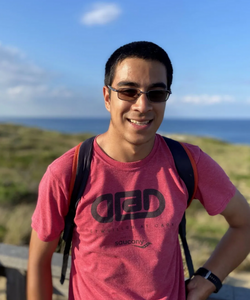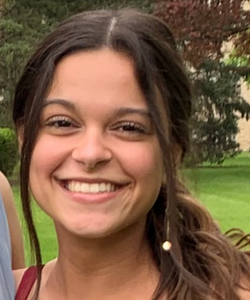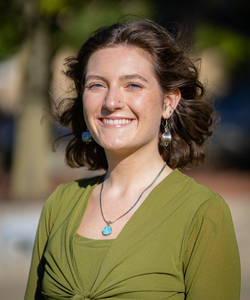As seniors in the Department of Psychology finish their final semester, their undergraduate experiences and post-graduation plans represent a variety of career interests. Here, we highlight three of our outstanding students.

Alex Beckerman X’23
After learning about the bystander effect in a College of Letters and Science honors class, senior Alex Beckerman decided to double major in psychology in addition to computer science. As he took computer science and cognitive psychology courses, his interest in user interface and user experience design (UI/UX) grew. The UI/UX field focuses on how people interact with products and information systems and how to design them to be easier to use. In the classes he has done UI/UX work, Beckerman says his psychology degree shaped how he evaluated research methods and conducted interviews to collect insights about user experience.
“The goal of UI/UX is sort of to go through that research, that design, and then later that implementation of it and make things more accessible, easier for people to use, more intuitive,” Beckerman says.
Since the summer after his sophomore year, Beckerman has helped develop and design online courses for the World-Class Instructional Design and Assessment (WIDA) Consortium, a project based at the Wisconsin Center for Education Research that designs standards, assessments, and teaching resources for multilingual learners. After graduating with a double major and certificate in game design this spring, Beckerman will pursue his master’s degree in design and innovation at UW-Madison.

Antonina Brandt X’23
When senior Antonina Brandt came to UW-Madison, she knew she wanted to study psychology. But after watching a dietician who appeared on her TikTok For You Page during the COVID-19 pandemic her freshman year, she decided to double major in psychology and nutritional sciences and dietetics. Brandt has worked as a nutrition assistant at Camp Randall since her sophomore year. When she started applying to graduate schools, she decided to focus on a career in mental health counseling.
“I want to provide that service to other people,” Brandt says. “I want to be a therapist, and that is what I feel is my duty for the rest of my life as a profession.”
During her sophomore year, Brandt also served as an undergraduate teaching fellow for Counseling Psychology 125, where she co-taught with an instructor and facilitated class discussions. Her experience meeting one-on-one with students reinforced her plans to pursue a career in counseling. Next fall, Brandt will begin a master’s program in clinical mental health counseling at Marquette, for which she says her psychology degree has provided her a solid foundation.

Briley Rossiter X’23
After seeing mental health issues revealed by the COVID-19 pandemic and taking a few geology courses, senior Briley Rossiter dropped her geology major and changed to a double major in conservation biology and psychology. These interests led her to work three semesters with the Brauer Group Lab, which studies group dynamics and behavior change, including concerning environmental sustainability. Rossiter has also worked as a peer wellness coach through Rec Well since her sophomore year, where she says she has been able to apply what she has learned in psychology courses alongside additional training.
Rossiter will graduate this spring with a psychology degree and certificates in environmental studies and French. Next year, Rossiter hopes to teach English in France at the secondary school level. After the teaching abroad program, Rossiter plans to pursue a master’s in social work in the U.S. to become a mental health counselor. In the long term, Rossiter hopes to balance working with clients with her involvement with Ainsely’s Angels, a non-profit her father founded that provides custom-adapted wheelchairs to help get people with disabilities involved in athletic events; the organization was inspired by her younger sister Ainsley who had a physical disability. Rossiter hopes to expand the support the organization provides to families of those with disabilities.
“It’s something that I see myself really being involved with,” Rossiter says, “bringing that psychology lens and what I’ve learned through psychology, through social work, into this organization to kind of build that out.”